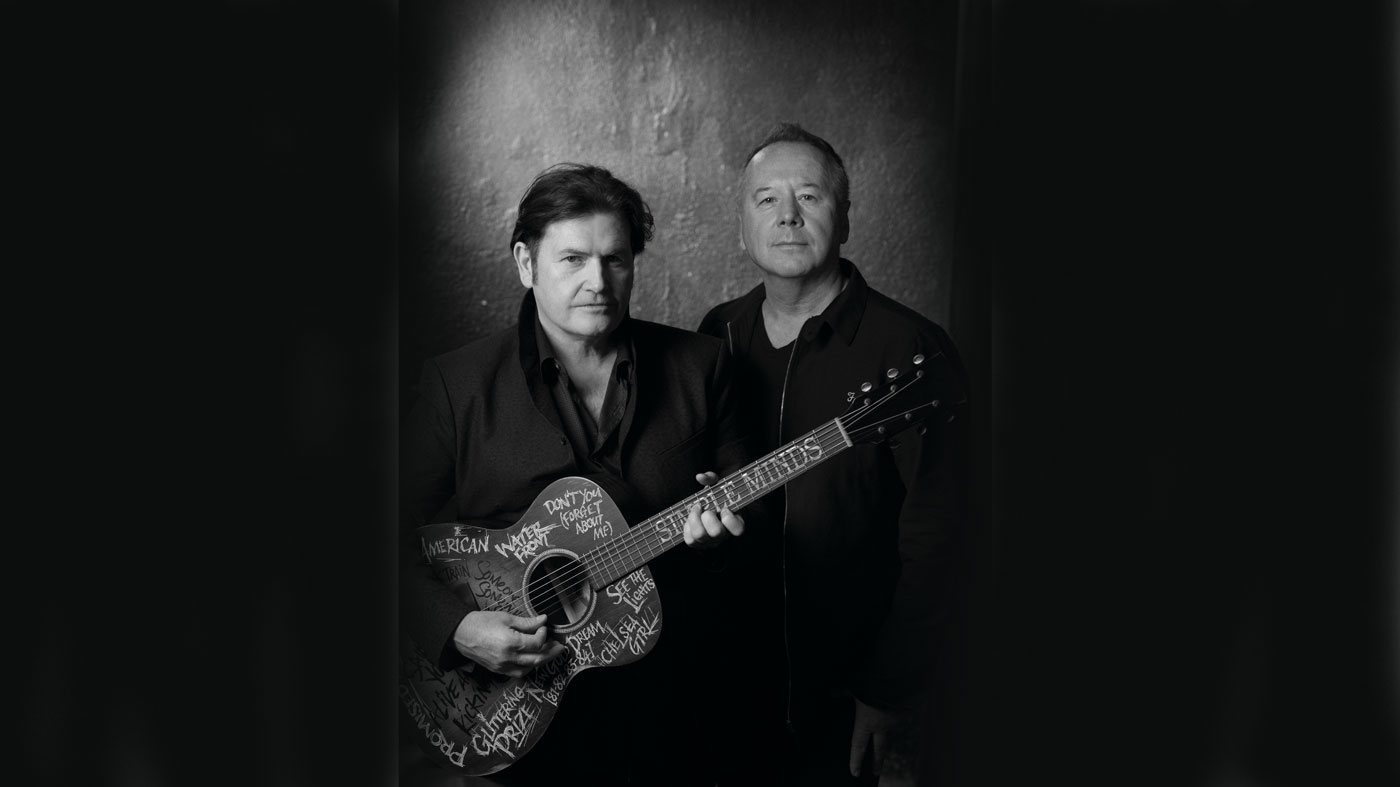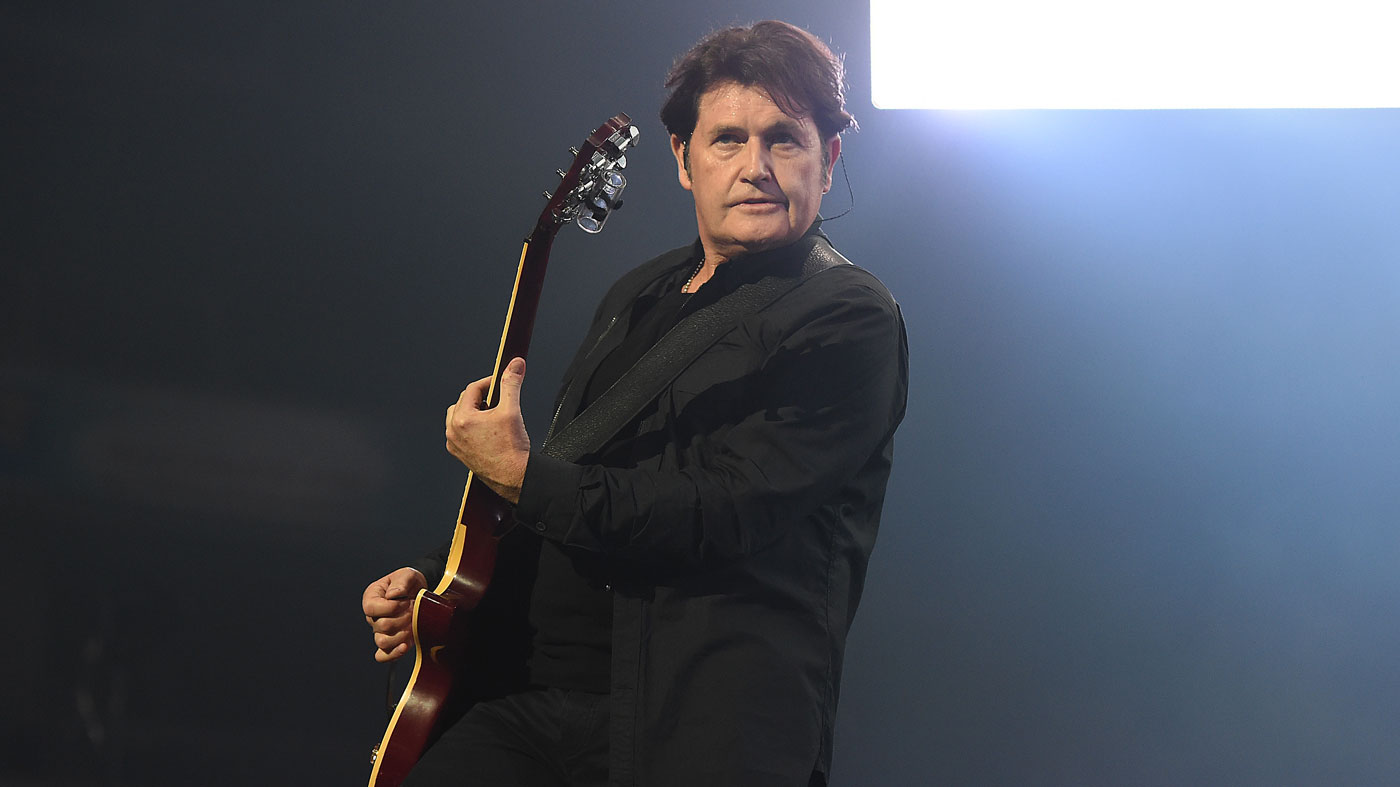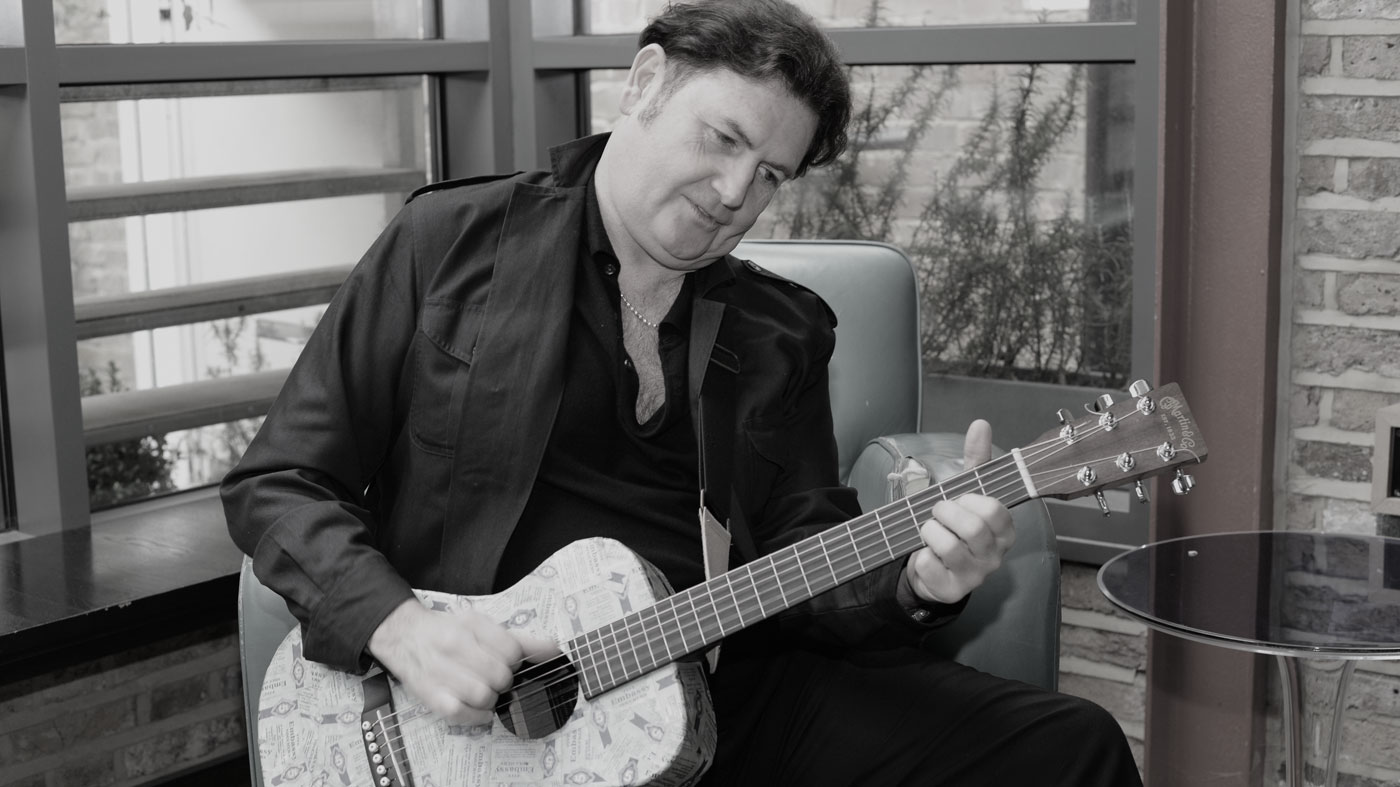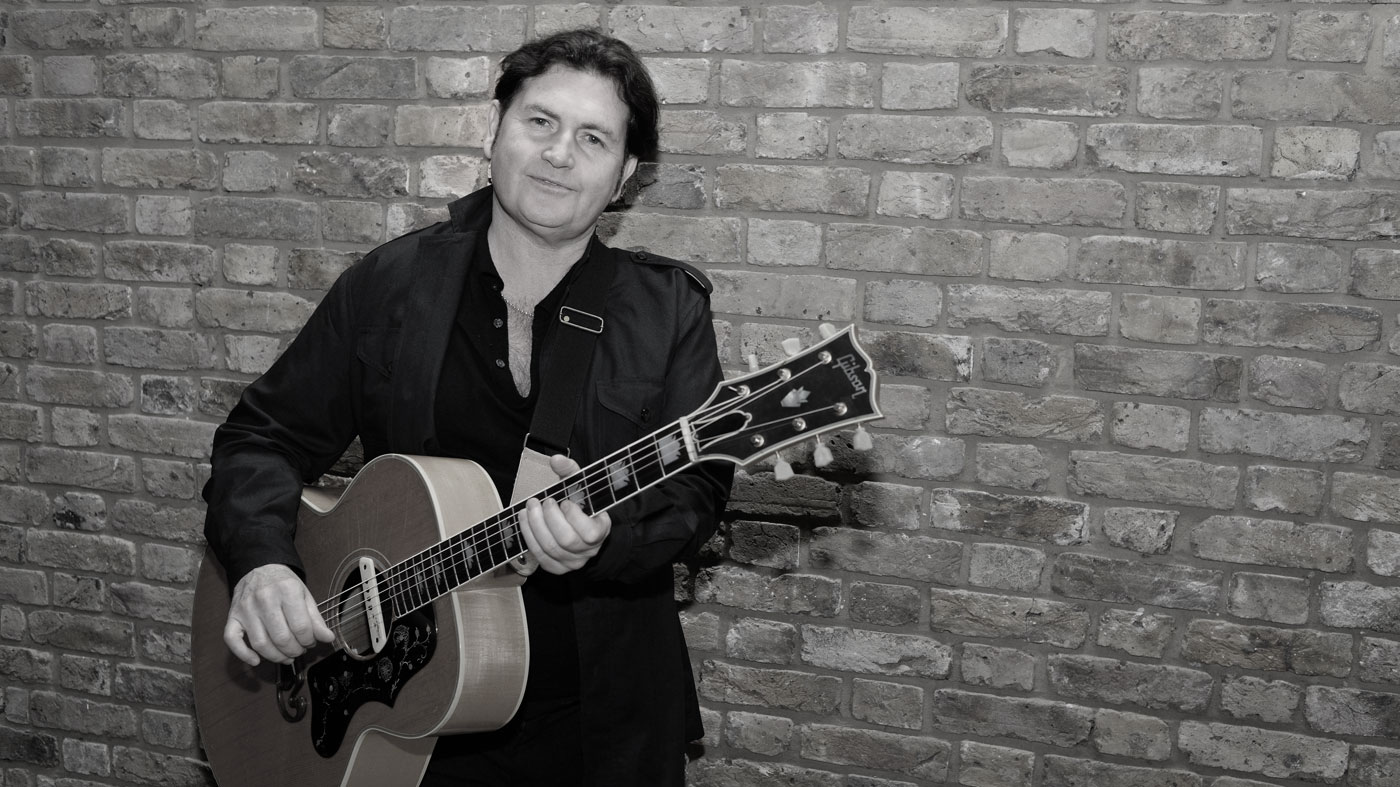Simple Minds' Charlie Burchill: how we reworked classic synth cuts for acoustic guitar
Talking guitars and new album Acoustic

Introduction
Simple Minds, stadium darlings for decades, are not a band you immediately associate with acoustic music. Soaring synths, pounding bass and choppy chords on a Les Paul, while Jim Kerr wrestled his mic stand, were the sights and sounds that filled venues around the world.
But behind those anthemic chords is a man who discovered his love of guitar playing by trying to work out Joni Mitchell songs, by ear, on a guitar bought for him with coupons his mum saved from Embassy cigarette (remember those?) packets.
The obvious question is why now for a stripped down acoustic album?
Charlie Burchill, school friend of Jim Kerr, co-founder of Simple Minds and co-writer of some of the defining songs of the 1980s, arrives at a West London recording studio and greets everyone with a warm smile and a welder’s handshake.
This is a powerfully built man who grew up in the Gorbals, and still has a strong Glasgow accent, but today we are going to see his softer side and talk acoustic guitars and the band’s new album Simple Minds Acoustic. With Jim and Charlie about to tour Germany backed by a symphony orchestra, the obvious question is why now for a stripped down acoustic album?
“Our European labels, especially in Italy and Germany, had been on at us for ages to do it but we didn’t want to do a ‘here’s versions of the tracks,’ just pared down,” he says with throaty laugh. “We call it ‘bongos on the beach’ and for a long time we resisted!”

Three for '2
However, after playing a three-song set in 2014 on Chris Evans’ Radio 2 show with just Jim Kerr on vocals with Charlie and his brother Mark on acoustic guitars, they decided that they would do something acoustic-based.
Normally you would have a track list of what might, or might not, work, but Jim said that maybe we should stretch ourselves
“Normally you would have a track list of what might, or might not, work, but Jim said that maybe we should stretch ourselves.” With that in mind, Charlie took a look at their back catalogue.
“We had this body of work, so I mocked up versions of tracks and gave them a different angle. Then we started adding tracks that we thought might work. Chelsea Girl, a track Jim and I wrote in about 1977 was one of those. There were some tracks, like New Gold Dream that should never have worked. Waterfront was another one but we gave it a bit more of a Celtic feel and…” he pauses and smiles.
“We agonised over this, you know, doing songs that had been done before, but we really deconstructed them, creating versions of these songs that were genuinely different. I think we have achieved that with quite a few of them. There’s a track, Someone Somewhere in Summertime (from 1982’s New Gold Dreams), which has a totally darker feel to the original.”

Calling in KT
A standout track from the new album is a reworking of ‘Promised You A Miracle’ featuring KT Tunstall on vocals and guitar.
I still think of her as a young artist but she’s done her 10,000 hours and she’s been around for ages
“She’s amazing,” Burchill says. “She’s a special talent. We had met her a couple of times. She’s such a talent and in the studio with her she just took over. I still think of her as a young artist but she’s really mature and she’s done her 10,000 hours and she’s been around for ages.”
Not surprisingly there is also a reworking of ‘Don’t You (Forget About Me)’, the song that broke the band in America after it was used in the movie The Breakfast Club. Charlie recalls how bizarre he found it, back in 1985, that they selected a Scottish band for a quintessentially American coming of age movie and then shot the video in an English stately home. It was all a long way from the Gorbals.
Talking of which, and getting back to the new album, he adds: “Where we recorded some of this album was in Gorbals Sound, which is a studio in the same building where Jim and I did our first ever gig. The first time we ever stood on a stage was in this place playing to orphans,” he laughs, “we played 10 Velvet Underground songs. So it’s full circle.”

Tuning-in
For the photoshoot he has brought along a few favourites from his expansive collection so, naturally, we get down to the nitty gritty.
“On acoustics I use .11-.52s, although on electric I use .10-.47s, Elixirs on both,” he says, before moving on to list performers who inspired him to practise in those early years.
I came across EAEGAE, which I thought Joni Mitchell used on For The Roses - it wasn’t but actually it was a fantastic tuning for me
“I grew up with Bob Dylan, Joni Mitchell, Neil Young and we even had Loudon Wainwright III albums. My brother is four years older than me and he played a bit of guitar as well. One of my biggest acoustic heroes was David Bowie - the first guitar I ever wanted was a 12-string… I just wanted a blue 12-string.”
He lists a few other early influences: Paul Simon, “he’s an amazing guitar player”; Leonard Cohen; John Martyn, “he was amazing… that voice. We met him a couple of times, but it was more his sound, the echoes, that sort of thing that interested me,” but the inspiration that he keeps returning to is Joni Mitchell, both as a guitarist and a songwriter.
Joni leads us on to tunings. “Years ago I was a big fan of Joni Mitchell, and I was always trying to figure out her songs. I came across a tuning that I thought was a tuning that she used on this track, For The Roses, and it wasn’t but actually it was a fantastic tuning for me. I use that quite often when we are in the studio.”
He uses this tuning, EAEGAE, on Light Travels a song from 2009’s Graffiti Soul and the most recent song to be given the acoustic treatment. “There are quite a lot of drop Ds on this album. The other one that I use, but it’s really a bizarre one, is CGDGAD, although none of the tracks on the album are using that.”

Ragtime
For a player one associates with Gretsch and Les Paul electric guitars, he rarely uses a pick when playing acoustically, preferring fingers and an open hand, fanning style of strumming.
This technique developed from playing, courtesy of Joni Mitchell again, a lot of songs with low tunings. “Your whole technique has to change,” he explains, “the strings are so floppy when A goes down to an F and she just feather strokes.”
I started learning a bit of ragtime - I always loved Steve Howe - so was getting a bit more technical with the finger picking
As a self-taught musician, who spent hours working out tunes from listening to albums, he’s tried various styles over the years. “I started learning a bit of ragtime - I always loved Steve Howe - so was getting a bit more technical with the finger picking, but I never got stuck with any technique as such, just how I felt and what I felt worked with the tuning. So I would learn what I had to, but it was my way of doing it.”
For the acoustic album he chose a varied selection of guitars from his collection.
“The main one I used was a 1964 Gibson Hummingbird. Also a Dove - a 1990 but it’s a great one - a 1970 flat top Martin and the 1970 Gibson J200. There’s also a bit of old Dobro in there and my 12-string Guild on ‘See The Lights’. There’s quite a bit of 12-string buried in the album. You might think that it was chorus or something but it’s actually a 12-string,” he laughs.
Other favourites include a British-made Manson 12-string, a Dinsdale archtop, a Lowden, a Gurian from the USA, several Gibson J45s and a Japanese Yairi 12-string. Finally, the question that every musician has an answer to: any guitars you wish you had never sold or which someone ‘borrowed’ and never returned?
“I had three guitars, Gibsons, that I had stolen - well they went missing, let’s put it that way - one was a black Les Paul, it was a 1969, one was a Barney Kessel which, was a 1965, and one Chet Atkins acoustic electric 12-string. Those three went missing and I’m sure that they are out there somewhere. It’s a mystery this thing, but it was a killer, the ‘69 Les Paul I had used on so many records and it was a beauty.”
Simple Minds Acoustic is out now via Caroline International.

